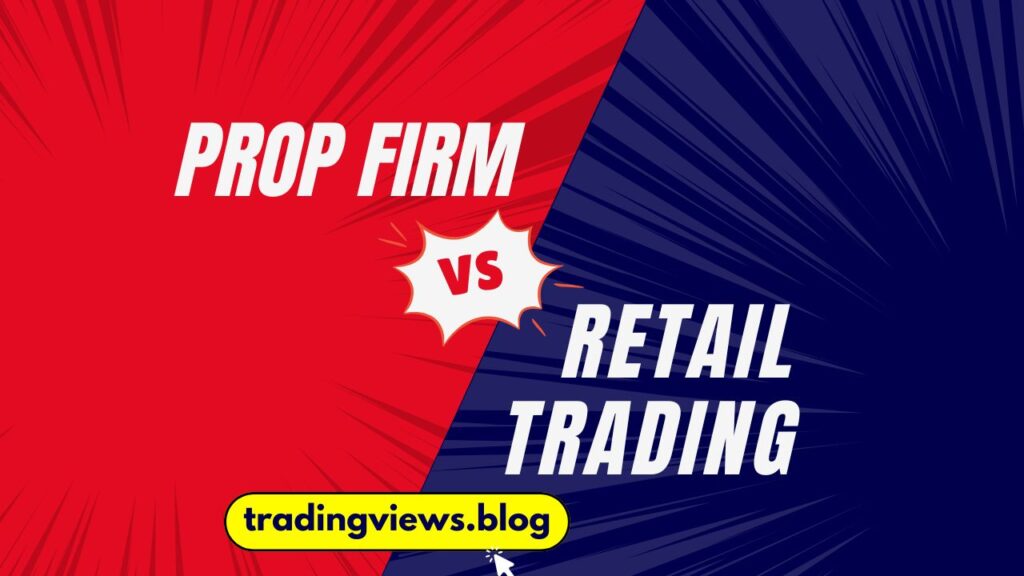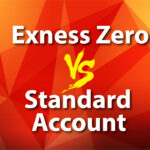Proprietary (prop) firms and retail traders each present what they have to offer which in turn brings in different sets of pros and cons that are a result of what the market is doing, what tech is available and what the trader himself prefers. In this article we look at the main differences between prop firm and retail trading which in 2025 we hope will help day traders determine which is the best fit for their what they are trying to achieve, their risk tolerance and trading style.
Prop Firm vs Retail Trading: Understanding Prop Firm Trading in 2025
Prop in the trade is a type of trading which is done with money from a proprietary trading company as opposed to personal money. Traders go through eval sets or what is also known as instant funding models in to prove they are worthy of handling the company’s money. Which traders do well at this they share in the profits which can be as high as 80% to 90% of the gains which also takes into account performance and account size.
Key Features of Prop Trading: Key Aspects of Prop Trading:
• Access to Larger Capital: Prop firms have a greater capital pool which most retail traders don’t have access to, this in turn allows for larger position sizes and which may result in greater profits.
• Structured Environment: Traders report to follow very strict risk management rules which include maximum drawdown limits, daily loss caps also at time of different trading hours or instruments they may be restricted from.
• Professional Tools and Support: Many trading firms present to their clients advanced platforms, real time analytics, mentorship, and a community of experienced traders.
• Profit Sharing: Traders get out with 80‑90% of the profit which the firm takes a share of.
• Reduced Personal Financial Risk: Since which is the firm’s capital that traders use, for their personal funds the risk is very little and mostly to an evaluation fee of subscription.
In 2025 prop trading has seen the introduction of many new funding models which include one step challenges, two step evaluations, and instant funding accounts that have made it possible to trade right away but also come with more strict rules17.
Prop Firm vs Retail Trading: Retail Trading in 2025
Retail trading is which you trade with your own money via a brokerage account. Retail traders have full freedom but bear the full financial risk.
Key Features of Retail Trading: Main Points in Retail Trading:
• Complete Control: Retail traders determine their own strategies, risk levels, trade sizes and timing.
• Keep 100% of Profits: All results are for the trader, but in the case of losses they also come out of the trader’s own capital.
• Limited Capital: Most of which retail traders do is to begin with very small accounts which may range from $500 to $5,000 which in turn also limits what positions they can take and profit potential.
• No Mandatory Rules: While freedom of choice is a benefit which we have, it can lead to impulsive trading and poor risk management at the lack of discipline.
• Self‑Directed Learning: Retail traders depend on self education and public tools while not having access to the structured mentoring or community support which prop firms provide127.
Prop Firm vs Retail Trading: Aspect Comparison for Day Traders
| Aspect | Prop Firm Trading | Retail Trading |
|---|---|---|
| Capital Investment | Large scale capital put in by the company which is limited to personal funds. | |
| Risk | Firm takes on the great majority of risk | Trader bears 100% of risk. |
| Profit Distribution | usually 80 to 90 percent goes to the trader and the rest to the firm | Trader takes in full profit. |
| Trading Rules | we have very strict risk management and trading policies | Complete freedom, no forced rules. |
| Tools and Support | Professional platforms, mentorship, community | Self‑sourced tools, limited formal support. |
| Emotional Pressure | High target achievement which is a source of stress | Also little external pressure but instead one must apply self discipline. |
| Regulation | which is at times not as strict but in terms of operation very flexible | High powered brokers. |
| Learning Curve | Environment support for quick skill gain | More gradual self paced learning. |
Prop Firm vs Retail Trading: Advantages of Prop Trading
1. Access to Significant Capital: Prop shops help traders to put on bigger trades which in turn may see greater total profits.
2. Reduced Personal Financial Risk: As a matter of fact we put most of our money in protecting your capital.
3. Structured Risk Management: Rules instill discipline which in turn helps traders to avoid catastrophic losses.
4. Professional Environment: Access to advanced tools and mentorship which in turn speeds up skill development.
5. Clear Path to Scaling: Many companies present scaling plans for better capital allocation as you show consistent profitability.
Prop Firm vs Retail Trading: Benefits of Retail Trading
1. Full Autonomy: You have full control over your trade.
2. Keep All Profits: No share in a company’s success means all the profit is yours.
3. Flexible Trading Style: No rules for instruments, holding periods, or trading hours.
4. No Evaluation Pressure: You may trade at your own speed without the stress of hitting profit marks or passing challenges.
Prop Firm vs Retail Trading: Challenges and Considerations
• Prop Trading Challenges: Strict rules and profit goals which in turn create psychological pressure. In profit sharing you do not get to keep 100% of what you earn and also should that which does not go to plan or that which goes against the rules may see you lose your funded status.
• Retail Trading Challenges: Limited by little financial resources growth is a issue, also in the lack of enforced risk management we see which leads to risky trading. Also without support self motivation and discipline are key.
Prop Firm vs Retail Trading: Who Should Choose Prop Trading?
Traders that want to put on larger positions but do not have enough of their own money.
Those that do well in a professional setting which has defined rules.
Traders that are eager to learn from experts and use top of the line tools.
Individuals that are able to deal with the stress of set targets and rules.
Prop Firm vs Retail Trading: Who Should Choose Retail Trading?
Traders that prefer full freedom and control over their strategies.
Those that prefer to retain all profits and not share with the firm.
Individuals that do well with independent study and risk management.
Traders that have large capital and are looking to avoid evaluation fees or subscriptions.
Prop Firm vs Retail Trading: Final Verdict for Day Traders in 2025
In 2025 prop firm trading is a which for day traders that sees great growth, large scale capital access and professional support, but it comes at the cost of very defined rules and profit sharing. Retail trading gives full freedom and profit retention but requires of the trader to be very disciplined and patient with capital growth.
For day traders that wish to grow fast and at the same time which want to reduce personal financial risk prop trading is the way to go. As for those that value independence and control retail trading still is an attractive option.
In the end what you choose depends on your risk tolerance, trading discipline, capital available to you, and long term goals. Also many successful traders what we see is they use both approaches at different stages of their career to maximize results.
📚 References
- FTMO Proprietary Trading Guidelines
- ESMA Retail Trading Regulations
- NinjaTrader Brokerage FAQs
- “Prop Trading vs. Retail Trading” – Investopedia (2024)
- BabyPips Risk Management Course
Visit for more Forex-related blogs: TradingViews
Get Fresh Daily News, Visit: WhyTrends




I like this web site its a master peace ! Glad I noticed this on google .
This is a topic close to my heart cheers, where are your contact details though?
You made some decent factors there. I regarded on the internet for the issue and found most people will go along with together with your website.
You are a very capable person!
Hi, just required you to know I he added your site to my Google bookmarks due to your layout. But seriously, I believe your internet site has 1 in the freshest theme I??ve came across. It extremely helps make reading your blog significantly easier.
Strong points made
Well structured
I do like the way you have framed this situation and it really does present me a lot of fodder for thought. Nevertheless, coming from what precisely I have observed, I simply hope when other responses pack on that people today remain on point and in no way start on a tirade of some other news du jour. All the same, thank you for this excellent point and even though I can not necessarily concur with it in totality, I respect the perspective.
Your point of view caught my eye and was very interesting. Thanks. I have a question for you.
**mitolyn reviews**
Mitolyn is a carefully developed, plant-based formula created to help support metabolic efficiency and encourage healthy, lasting weight management.